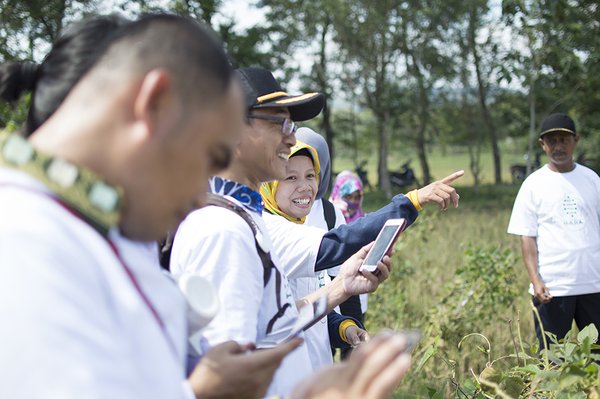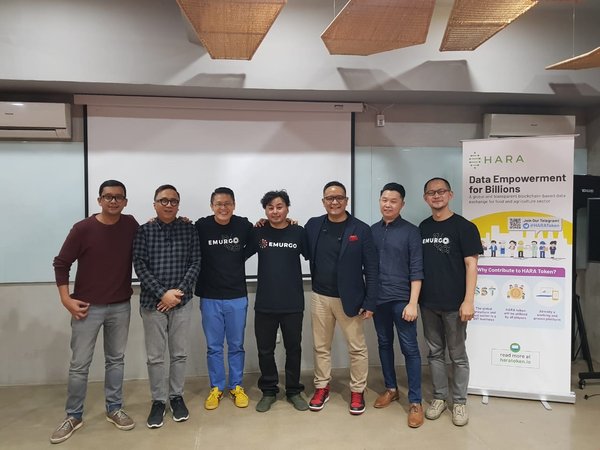JAKARTA, Indonesia, July 13, 2018 /PRNewswire/ -- In the last decade, countries all over Southeast Asia have seen a rapid economic growth. However, for most of the poorer inhabitants of the region, this economic growth has not been reflected by a substantial improvement in their quality of life. Thankfully, all over the region, organizations are coming up with creative blockchain technology solutions to directly affect the lives of those left behind.
In Indonesia, HARA is the prime example of an organization that tries to implement blockchain technology to have real social impact. HARA is a data exchange platform focused on the agriculture and food sector that aims to provide farmers and all other agricultural players with access to reliable data and transactions.
Last week, HARA was joined by Cardano's Emurgo in hosting the Blockchain for Real World Problems event in Jakarta. In a packed room, speakers from both organizations shared with an enthusiastic audience how they plan to use blockchain technology to tackle real problems.
"I think HARA has so much potential," comments Shunsuke Murasaki, Head of Business Development at Emurgo, "HARA has done a lot. They have already done proof of concept. I think HARA is going to bring a sort of justice, equality to farmers."
HARA's CEO Regi Wahyu gave an extensive explanation of their mission to improve the lives of billions through the use of data. He carefully laid out their business model, plan of action, and what the company has already done to reach their goals.
Most notably were the impressive results of HARA's pilot project in Indonesia, and the extensive list of high-profile advisors. In their pilot project, HARA has already successfully collected data from farmers through an incentive mechanism -- work which has been recognized and endorsed by the local government.
Murasaki commented that Cardano's philosophy is very similar to HARA's, but tackles a different angle, "Cardano is going to provide financial stocks to people suffering from financial exclusion, and HARA does the same for farmers."
His company, Emurgo, supports the development of local ventures and helps integrate them into Cardano's blockchain platform. The company has already set up a presence in countries like Indonesia, Japan, Vietnam, Hong Kong, and Singapore to help develop the local blockchain communities.
In Indonesia, Emurgo focuses on setting up a network of education centres in cooperation with local organizations and universities in the computer sciences field, fostering enterprise solutions with blockchain technology, as well as actively seeking to partner up with local ventures that are already on the right track. HARA, on the other hand, is creating a large network of smallholder farmers and other stakeholders in the agriculture sector that will participate in HARA data-exchange ecosystem.
"I think, globally that Indonesia is a key market. I think in Indonesia specifically there's a sort of tenacity and endeavouring spirit to do a lot of start-ups. Blockchain companies are really realizing that and starting to hone in on these markets, and they're seeing projects like HARA really leading the charge and sort of carrying the flag for Indonesia," commented Steven Suhadi, chairman of the Indonesian Blockchain Association.
"The biggest opportunity that I see in the South East Asia region is inefficiency," says Murasaki, arguing that the implementation of blockchain technology will do away with these inefficiencies and the possibility of fraud.
In Southeast Asia, the advent of blockchain technology has unearthed possible solutions to complicated problems the world has struggled with for decades. Both HARA and Cardano are examples of blockchain organizations who are jumping on the opportunity to improve the lives of millions, with a mission to have the biggest social impact as possible.
About HARA
HARA is a blockchain-based data exchange for the food sector that has been operating since 2015. The company provides farmers and other players in the agricultural sector with access to reliable data and transparent transactions. HARA is a product designed by Dattabot, a leading big data company in Indonesia.
In a pilot project, HARA has already acquired usually hard-to-find food data, such as Know Your Customer (KYC), farmer, land, and weather data, in different provinces across Indonesia. This data is beneficial in assisting financial institution partners to disburse loans in a growing market. Furthermore, the incentive mechanisms ensuring continuous usage of the application in the ecosystem have also been proven to work.
For further information, please visit our website: https://www.haratoken.io/ and join the conversation with HARA Token Community on Telegram: https://t.me/@HARAToken
About Cardano
The blockchain platform Cardano is one of the biggest organizations in the blockchain world that is making strong headway Southeast Asia. Cardano's mission is to achieve fair society. The organization is divided into three entities that contribute to making that mission a reality, one of these is Emurgo, the venture builder of Cardano blockchain.
Emurgo's role is to create a more connected and equitable world through Cardano blockchain. They develop, support, and incubate commercial ventures and help integrate these businesses into Cardano's decentralized blockchain ecosystem. Cardano seeks to power the financial stack for the developing world, and EMURGO's mission is to help these economies emerge through blockchain technology.
Photo - https://photos.prnasia.com/prnh/20180712/2185484-1-a
Photo - https://photos.prnasia.com/prnh/20180712/2185484-1-b



